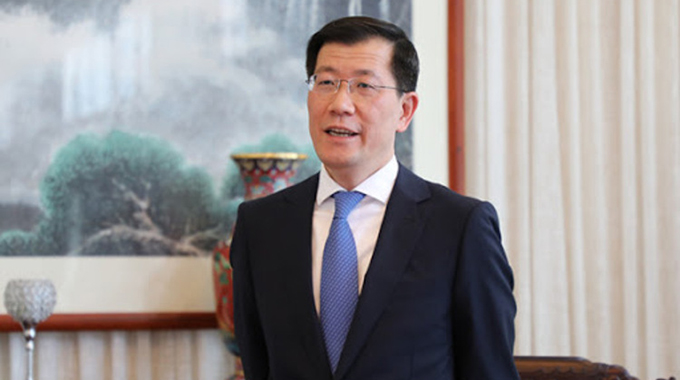Anti-sanctions: China, Russia make bold statements

Guo Shaochun
For two decades, Zimbabwe has been placed under illegal, unilateral sanctions. These sanctions are hurting. They are not just hurting the so called “targeted individuals and entities” as falsely claimed by their enforcers, but also hurting the entire country and its ordinary people.
For a country to develop, a normal and conducive external environment is essential. Sanctions tarnish Zimbabwe’s international image, spook investors, disrupt financial transactions between Zimbabwe and foreign countries and disable Zimbabwe from accessing lines of credit from International financial Institutions, which are essentially needed for the development of a country. These are facts beyond dispute.
The sanctions produced debilitating effects on the economy and general populace, not relenting even as innocent Zimbabweans suffered from natural disasters such as Cyclone Idai, severe drought, and a global pandemic. Their spillover effects in the region are visible. While there has been a heartening, reverberating call for an end to them across the continent and beyond, decision-makers in some capitals remain recalcitrant.
But Zimbabwe trudged on with dignity. The Government actively promotes a comprehensive reform agenda. Against the odds of man-made hurdles and adverse natural forces, it has managed to bring about order in the economy and protect its people fairly well from a pandemic that has rocked even the richest countries.
Ironically, those who wield unilateral sanctions do not hesitate to use multilateral institutions to criticise Zimbabwe for some of these efforts.
This reveals a deeper, structural problem in our world today: a few powers remain convinced they can dictate how other countries develop; they are not bound by international law, the basic norms of international relations, or the purposes and principles of the UN Charter. Rather, they can selectively apply these international instruments and values when it is convenient and abuse them when necessary.
Dangerous, but not new.
For a considerable period in history, the trampling these sacrosanct values set free the all too familiar evils of imperialism, colonialism, and slavery. These terrible human inventions have been pronounced dead on paper as we mark the 75th anniversary of the UN and the victory over fascism this year. But, as the case of Zimbabwe shows, they still lurk deep in some minds and in the global architecture of power. All those who have been subjected to their brutality cannot afford to not be vigilant.
But the days when developing nations suffered silently and separately are gone. Today, we are united in our voices and actions. On 6 October, the Chinese representative delivered a statement on behalf of a group of countries at the UN General Assembly. The statement criticized the unilateral coercive measures for impeding the full realization of social and economic development and hindering the well-being of the population in the affected countries, particularly the vulnerable. It reaffirmed China’s call for the complete and immediate lifting of unilateral coercive measures for a full, effective and efficient response of all members of the international community to COVID-19.
It expressed deep regret for the loss of vulnerable lives to racism and police brutality and the disproportionately high mortality rates of people of African descent in places where they are a minority. It urged the full implementation of the Human Rights Council resolution which provides for “the promotion and protection of the human rights and fundamental freedoms of Africans and of people of African descent against excessive use of force and other human rights violations by law enforcement officers”.
Saying no to injustices is not enough. Developing countries must also combine their forces to make our world a fair and respectful place. Last month at the UN, Chinese President Xi Jinping proposed China’s vision for the role of the organisation in the post-Covid 19 world.
He called on the UN to stand firm for justice, uphold the rule of law, promote cooperation, and focus on real action. These principles also work in a larger context in terms of what kind of a world we should aspire to build.
To promote justice, there must be mutual respect and equality among all countries. No country has the right to dominate global affairs, control the destiny of others, or keep advantages in development all to itself. Even less should one be allowed to do whatever it likes and be the hegemony, bully or boss of the world. Unilateralism is a dead end. It is imperative that the representation and voice of developing countries be increased.
To uphold the rule of law, the purposes and principles of the UN Charter must be the fundamental guidelines for handling international relations. Relations among countries and coordination of their interests must only be based on rules and institutions; they must not be lorded over by those who wave a strong fist at others. There must be no practice of exceptionalism or double standards.
Nor should international law be distorted and used as a pretext to undermine other countries’ legitimate rights and interests or world peace and stability.
To promote cooperation, the Cold War mentality, ideological prejudice and zero-sum game should be rejected. In place of conflict, coercion, and zero-sum game, there should be dialogue, consultation and win-win results. We need to pursue the common interests of all as we each work to safeguard our own interests. We need to expand the converging interests of all and build a big global family of harmony and cooperation.
To take real action, we must get down to solving problems and measure ourself against tangible outcomes. Security, development as well as human rights should be advanced in parallel. The issue of development should be highlighted in the global macro framework; and there should be a greater emphasis on the promotion and protection of the rights to subsistence and development.
Historically, injustices in international relations forced the developing countries into subjugation and poverty.
Today, they are still holding them back in independently choosing a path of development.
This has to change. Pushing for the removal of unilateral sanctions on Zimbabwe is a good starting point.
Guo Chaochun is Chinese Ambassador to Zimbabwe.
Nikolai V. Krasilnikov
2020 is a special year since all the goodwill people celebrate the 75th anniversary of the victory in the Second World War, the 75th Anniversary of establishing the United Nations and the 60th anniversary of the UN declaration on the granting of independence to colonial counties and people.
Russia believes it is unacceptable to turn a blind eye to attempts of promoting neo-colonial practices. It is obvious that one of such ways of making negative impact on socio-economic developments is the mechanism of unilateral coercive measures designed to force regime change, such as sanctions imposed on the Republic of Zimbabwe for almost 20 years and maintained by the Unites States and the European Union.
These restrictions are illegitimate as they bypass the United Nations. Amid global economy crisis unilateral politically motivated restrictive measures block access to international credit markets and advanced technologies, including in health care. At the dark time of the pandemic their immoral and inhuman character is highlighted.
The Russian Federation and like-minded states as well as multilateral institutions have been constantly calling for abolishing the unlawful measures.
As the President of the Russian Federation Vladimir Putin emphasized at Russia-Africa Summit in Sochi last year; “We invariably advocate the principle stipulating African solutions for African problems”.
We express solidarity with SADC countries in observing October 25 as Anti-Sanctions Day to provide the strong support to the Republic of Zimbabwe. Russia’s practical assistance in this regard is being revealed in the United Nations where we raise the voice against unilateral coercive measures as well as through investments and transfer of technologies into Zimbabwe.

Ambassador Nikolai V. Krasilnikov
The Russian-Zimbabwean joint venture, Great Dyke Investments (GDI), is developing one of the world’s largest platinum group metals (PGM) deposits in Darwendale on the basis of the 2014 Intergovernmental Agreement expects to produce the first concentrate in 2022. The Government of the Republic of Zimbabwe emphasizes the key role of Darwendale in attaining the 2023 milestone of US$12 billion exports from the mining sector. The GDI management pays special attention to discharging social obligations. To date, more than 300 residents of Mashonaland West province have been employed. Assistance has been provided to the local population on a regular basis, including prevention of the coronavirus and protection of the environment.
The Alrosa Zim joint venture launched prospecting works this year. In July 2020 geologists started sampling in Malipati zone, with ground geophysical survey to follow. It is expected that towards the end of year the same prospecting operations will be conducted in the Maitengwe area. Bulk sampling and drilling are to commence in 2021. The venture envisages US$12 million investment up to 2022.
Russian fertiliser company Ecorost has started importing organic fertilizers made of peat. Russian and Zimbabwean businessmen are preparing to increase the supply and to set up a manufacturing plant in Mutare. The experiments of the Ecorost products will be conducted on the sites of the Department of Agritex with the assistance of the Department of Research and Specialist Services to identify the agronomic efficiency in cultivation of different crop plants and forestry as well as to estimate the capacity of manufacturing in Zimbabwe.
There are good prospects for Zimbabwe joining the clinical trials of the Russian Covid-19 vaccine, Sputnik V.
These are important steps towards strengthening the Moscow-Harare partnership in pursuance of the highest-level arrangements as well as the decisions of the Intergovernmental Commission on Economic, Trade, Scientific and Technical Cooperation.
The Russian Federation is committed to supporting the vigorous efforts by the Zimbabwean Government under the leadership of His Excellence Cde ED Mnangagwa in attaining the goals of Vision-2030 as well as National Development Strategy for 2021-2025.
Embassy of the Russian Federation in the Republic of Zimbabwe.









Comments